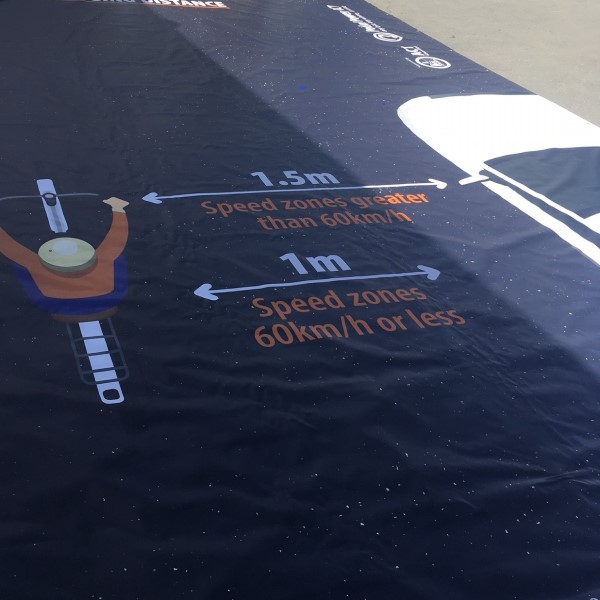
Marcus Boorman from ACT Policing, Pedal Power CEO Ian Ross and ACT Road Safety Minister Shane Rattenbury at the launch of the educational ‘passing mats’. Photos: Supplied.
Pedal Power ACT has called on the ACT Government to install road signs about the minimum distances for passing cyclists as concern increases over the number of cyclists who have been killed on roads in the Canberra region in recent years.
The cycling organisation called for the signage to be installed on roads commonly used by recreational riders during the launch yesterday (March 3) of educational ‘passing mats’ showing life-size images of a car and bike relative to the legal passing distances of 1 and 1.5 metres.
Pedal Power ACT yesterday also renewed its recent calls for a cycling safety audit on all country roads in the ACT and surrounding region, saying that the recent deaths of four cyclists in the region were “entirely avoidable”.
“The tragic reality is that four people have been killed cycling on roads in our region in less than two years – the most recent only three weeks ago,” said Pedal Power CEO Ian Ross.
“These deaths are entirely avoidable and we must act now to improve safety on our roads.”
Last Friday (March 1), Coroner Bernadette Boss found that the death of elite British cyclist Michael Hall after being struck by a car on the Monaro Highway on 31 March 2017 was “avoidable” and made six recommendations to enhance rider safety, including a review of the intersection of the Monaro Highway and Williamsdale Road to evaluate its risk to road users.
Last month a 38-year-old Sydney truck-driver was charged with dangerous driving occasioning death, and negligent driving occasioning death following the death of a cyclist, Major Aaron Couchman, near the NSW/ACT border on February 9.
ACT Road Safety Minister Shane Rattenbury unveiled Pedal Power’s minimum passing distance mats at the Big Canberra Bike Ride yesterday and said they remind Canberra drivers that they must provide space for cyclists on the road.

ACT Road Safety Minister Shane Rattenbury unveiled the minimum passing distance mats at the Big Canberra Bike Ride.
“In the ACT we simply do not accept that there should be any deaths on our roads,” said Mr Rattenbury at yesterday’s launch which was held in conjunction with Pedal Power ACT, ACT Policing and national cycle safety organisation the Amy Gillett Foundation.
“Cyclists are particularly vulnerable on the road because they are smaller and have less crash protection than motorists.
“Motorists must keep a safe passing distance to avoid rear-end and sideswipe crashes.”
In the ACT, drivers are required to keep a minimum passing distance of 1 metre when overtaking a cyclist at under 60 km/h, with a distance of 1.5 metres required if a driver is overtaking at more than 60 km/h.

In the ACT, drivers are required to keep a minimum passing distance of 1 metre when overtaking a cyclist at under 60 km/h or 1.5 metres if overtaking at more than 60 km/h.
To provide this distance on narrow roads, motorists are allowed to cross or straddle the centre lines, provided the driver has a clear view of any approaching traffic and that it is safe to do so. If it is not safe to pass, drivers must wait behind the cyclist until the road conditions change.
Drivers who fail to comply with this rule can receive a $292 fine and two demerit points.
Mr Ross said that in the three years since the passing laws were first introduced Pedal Power has seen an improvement in driver behaviour in the ACT.
“But legal reform is not enough – we need a comprehensive education and enforcement campaign to make sure that all drivers are aware of the passing distances and how to share the road safely with people on bikes,” he said.
Pedal Power received more than $4,600 from the ACT’s 2018 Road Safety Fund community grants program to purchase and display the four life-size printed minimum passing distance mats.
Mr Ross said the design of the mats is based on materials produced by the West Midlands Police in the UK in an award-winning education and enforcement campaign which led to a 20 per cent reduction in cycling deaths and serious accidents.
“The mat gives drivers a clear understanding of exactly what legal passing distances look like, and how much space we need to allow when overtaking bikes safely and according to the law,” he said.
“The mats will be used in Pedal Power’s education programs, and provided to ACT Policing for use in their traffic operations campaigns.”
Yesterday, the ACT Government also commented on the findings of the inquest into Mr Hall’s death, saying it would carefully consider the Coroner’s report and provide a formal response in coming months.
On Friday, Roads Minister Chris Steel said that prior to the incident taking place, the ACT Government had committed up to $100 million to upgrade the Monaro Highway.
Mr Steel said that the Coroner’s recommendations will be considered as part of the planning work that is currently underway.















